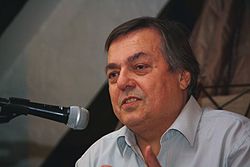Drago Jančar
| Drago Jančar | |
|---|---|
 |
|
| Born |
April 13, 1948 Maribor, Socialist Federal Republic of Yugoslavia (now in Slovenia) |
| Occupation | Writer, Essayist, Playwright |
| Literary movement | Postmodernism, Magical realism |
Drago Jančar (born 13 April 1948) is a Slovenian writer, playwright and essayist. Jančar is one of the most well-known contemporary Slovene writers. In Slovenia, he is also famous for his political commentaries and civic engagement.
He was born in Maribor, an industrial center in what was then the Yugoslav Socialist Republic of Slovenia. His father, originally from the Prekmurje region, joined Slovene Partisans during World War II. Jančar studied law in his home town. While a student, he became chief editor of the student journal Katedra; he soon came in conflict with the Communist establishment because he published some articles critical of the ruling regime. He had to leave the journal. He soon found a job as an assistant at the Maribor daily newspaper Večer. In 1974 he was arrested by Yugoslav authorities for bringing to Yugoslavia a booklet entitled V Rogu ležimo pobiti (We Lie Killed in the Rog Forest), which he had bought in nearby Austria and lent to some friends. The booklet was a survivor's account of the Kočevski Rog massacres of the Slovene Home Guard war prisoners perpetrated by Josip Broz Tito's regime in May 1945. He was sentenced to a year's imprisonment for "spreading hostile propaganda" but was released after three months. Immediately after his release he was called up for military service in southern Serbia, where he was subjected to systematic harassment by his superiors due to his "criminal file".
After completing military service, Jančar briefly returned to Večer, but he was allowed to perform only administrative work. He decided to move to Ljubljana, where he came into contact with several influential artists and intellectuals who were also critical of the cultural policies of the Communist establishment, among them Edvard Kocbek, Ivan Urbančič, Alenka Puhar, Marjan Rožanc, and Rudi Šeligo. Between 1978 and 1980, he worked as a screenwriter in the film studio Viba Film, but he quit because his adaptation of Vitomil Zupan's script for Živojin Pavlović's movie See You in the Next War was censored. In 1981, he worked as a secretary for the Slovenska matica publishing house, where he is now an editor. In 1982, he was among the co-founders of the journal Nova revija, which soon emerged as the major alternative and opposition voice in Socialist Slovenia. He also befriended Boris Pahor, the Slovene writer from Trieste who wrote about his experience in the Nazi concentration camps. Jančar has frequently pointed out Pahor's profound influence on him, especially in the essay "The Man Who Said No" (1990), one of the first comprehensive assessments of Pahor's literary and moral role in the post-war era in Slovenia.
...
Wikipedia
